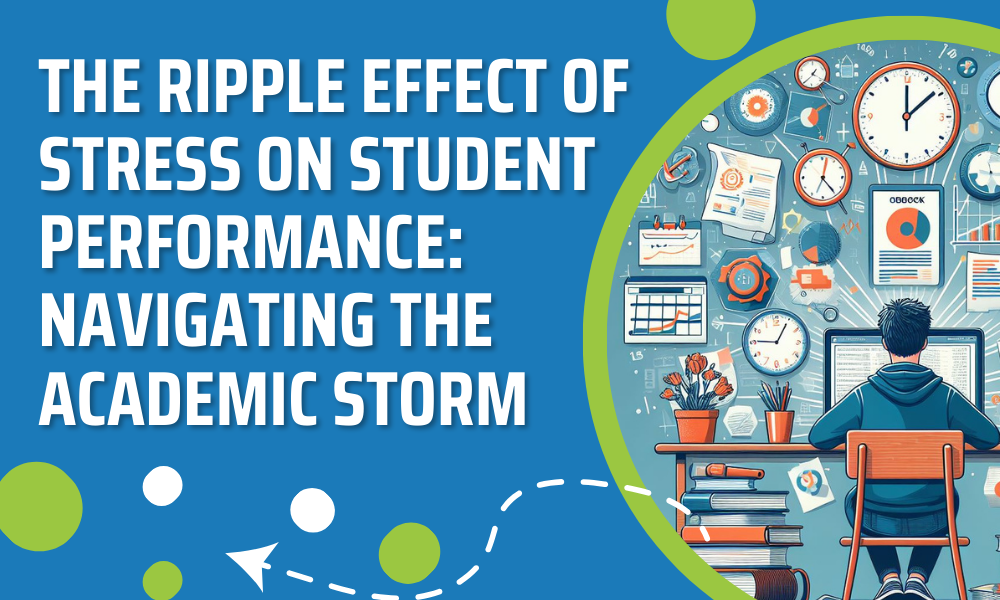
In the fast-paced and demanding world of academia, students often find themselves walking a tightrope between assignments, exams, and extracurricular activities. As they strive for success, stress becomes an inevitable companion. While a certain level of stress can be motivating, prolonged and overwhelming stress can have a profound impact on students’ overall well-being and academic performance.
The Physiology of Stress:
Before delving into the intricate relationship between stress and academic performance, it’s essential to understand the physiological aspects of stress. When faced with a stressful situation, the body releases hormones like cortisol and adrenaline, preparing the individual for a fight-or-flight response. While this response is crucial for survival, chronic activation of the stress response can lead to a range of physical and mental health issues.
The Academic Conundrum:
1. Cognitive Impairment:
Prolonged exposure to stress triggers the release of cortisol, a hormone associated with the body’s “fight or flight” response. While this response is crucial for survival, chronic elevation of cortisol levels can have detrimental effects on the brain. High cortisol levels over an extended period can lead to cognitive impairment, affecting memory retrieval, attention span, and decision-making processes. Students under chronic stress may struggle to concentrate during lectures, find it challenging to retain information, and experience difficulty in performing well in exams, hindering their overall academic success.
2. Emotional Well-being:
The emotional toll of stress is multifaceted, often manifesting as anxiety, depression, and burnout. Anxiety, characterized by excessive worry and fear, can paralyze students and hinder their ability to approach academic tasks with a clear mind. Depression, marked by persistent feelings of sadness and hopelessness, can drain the motivation needed to tackle coursework. Burnout, a state of emotional, physical, and mental exhaustion, can make it challenging for students to find joy in learning. The cumulative impact of these mental health challenges not only compromises the student’s overall well-being but also creates a barrier to effective engagement with academic tasks.
3. Impaired Sleep Patterns:
Stress and sleep are intricately connected. The heightened state of alertness induced by stress can interfere with the body’s natural sleep-wake cycle. Stress often leads to difficulties in falling asleep, staying asleep, or experiencing restorative sleep. Inadequate or poor-quality sleep further exacerbates cognitive impairments, as sleep is crucial for memory consolidation and overall cognitive function. Students who are unable to achieve sufficient and restful sleep face an uphill battle in maintaining the level of academic excellence expected of them.
4. Impact on Motivation and Engagement:
Chronic stress can significantly diminish a student’s motivation and enthusiasm for learning. When overwhelmed by the demands of academia, the joy of acquiring knowledge may be overshadowed by feelings of pressure and fatigue. The initial excitement and curiosity that drive engagement in coursework can be replaced by a sense of obligation and stress-induced apathy. Motivational and engagement levels are closely tied to academic success, and chronic stress poses a significant risk to both.
Coping Strategies:
Recognizing the intricate link between stress and academic performance, it is essential to adopt proactive coping strategies:
1. Time Management:
Time management is a crucial skill for academic success. Encourage students to use tools such as planners or digital calendars to organize their tasks and deadlines. Breaking down larger assignments into smaller, more manageable steps can make the workload seem less daunting. By creating a realistic schedule, students can allocate time for studying, attending classes, and engaging in extracurricular activities, ensuring a balanced approach to their academic responsibilities
2. Mindfulness and Relaxation Techniques:
Mindfulness practices can help students stay present and focused, reducing the impact of stress on their mental well-being. Techniques like deep breathing exercises, meditation, and progressive muscle relaxation can be incorporated into daily routines. These practices not only provide a moment of respite from academic pressures but also contribute to long-term stress resilience. Encouraging students to take short breaks during study sessions to practice mindfulness can positively impact their overall mental health.
3. Healthy Lifestyle Choices:
Emphasizing the importance of a balanced lifestyle is essential for combating stress. Regular physical activity is known to release endorphins, which act as natural mood lifters. Encourage students to engage in activities they enjoy, whether it’s sports, yoga, or simply going for a walk. A nutritious diet rich in vitamins and minerals supports both physical and mental well-being. Additionally, adequate and restful sleep is crucial for cognitive function and emotional stability. Providing information on the benefits of a healthy lifestyle can motivate students to make positive choices that contribute to their overall resilience against stress.
4. Seeking Support:
The journey through academia can be challenging, and it’s crucial for students to know that seeking support is a sign of strength, not weakness. Encourage them to build a support system that may include friends, family, peers, or professionals. Connecting with others who share similar experiences can foster a sense of community and understanding. If stress becomes overwhelming, counsellors or mental health professionals can provide guidance and coping strategies tailored to individual needs. Creating an open and non-judgmental environment within the academic community reinforces the idea that everyone faces challenges, and seeking support is a proactive step towards well-being.
Conclusion:
In the intricate dance between stress and student performance, it is crucial to acknowledge the interconnectedness of physical and mental well-being. By fostering a culture that prioritizes mental health, implementing effective stress management strategies, and promoting a supportive learning environment, educational institutions can empower students to not only weather the academic storm but also thrive in the face of adversity. After all, the journey of education is not just about the destination but also about the well-being of those embarking on the path to knowledge and self-discovery.